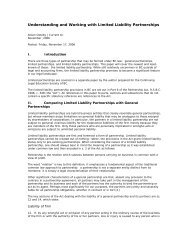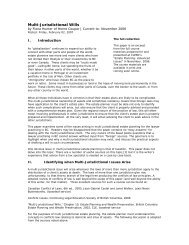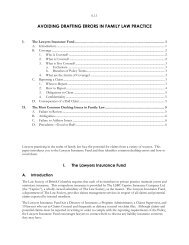Joint Ventures-The Limited Fiduciary Relationship Structure
Joint Ventures-The Limited Fiduciary Relationship Structure
Joint Ventures-The Limited Fiduciary Relationship Structure
You also want an ePaper? Increase the reach of your titles
YUMPU automatically turns print PDFs into web optimized ePapers that Google loves.
5.1.16<br />
Even though one party may have a controlling vote in the JV, the minority party is still entitled to<br />
legal protections. Due to the lesser fiduciary duties in a JV, the corporate law concepts of<br />
“oppression” do not exist. A JV will often state that the intentions of the parties are that, even if they<br />
disclaim fiduciary obligations, they must still govern themselves in the JV under a premise of “fair<br />
dealing.” While a well drafted JV agreement should leave little room for disputes and<br />
misunderstandings, all possible JV operating issues can not be foreseen by the draftsperson. Some<br />
form of alternative (to litigation) dispute resolution should at least be considered. An arbitration<br />
clause is a typical fallback, however, the writer is aware of one major American conglomerate that will<br />
not, as a matter of corporate policy, subject itself to arbitration clauses. <strong>The</strong>ir philosophy is that they<br />
would prefer to rely on their legal rights in a court of law knowing that pending litigation has the<br />
effect of forcing parties to mutually compromise. For this particular company, it seems the benefit<br />
that arbitration is a private process so details of the dispute are not available to the public does not<br />
overcome the concern about the looser evidentiary rules generally involved in an arbitration.<br />
<strong>The</strong> JV agreement should allow all participants a grievance procedure for certain kinds of transactions<br />
of the JV, such as where service fees, royalties or other benefits are paid to a participant. All nonarm’s<br />
length arrangements should be capable of being justified to an objective arbiter both for the<br />
benefit of the parties themselves but also to ensure tax authorities do not raise concern over transfer<br />
pricing and similar issues. <strong>The</strong> JV books of account must be transparent to all the participants, and to<br />
the extent required, government.<br />
E. Setting the JV Objectives<br />
Given that the parties should have already established all the principal objectives and rationale for<br />
creating a JV, it is very helpful for the JV agreement draftsperson to see the JV’s business plan. <strong>The</strong><br />
Plan should provide the particulars of the assets, technology and personnel to be contributed to or<br />
committed by the participants to the JV. <strong>The</strong> Plan should have some principal short term and long<br />
term budget information and relate this budget information to success-contingent milestones and<br />
decision points. <strong>The</strong> JV goals should be clear, measurable, achievable and verifiable.<br />
<strong>The</strong> job of the lawyer is twofold. <strong>The</strong> lawyer should ensure that the JV agreement properly reflects<br />
the Plan and the lawyer should also ensure that the JV agreement will deal with the most likely<br />
outcomes of the JV operations. Additionally, the Plan needs to be reviewed to advert the parties of<br />
potential tax issues, such as those described above in connection with the possibility of inadvertently<br />
triggering taxable dispositions to participants contributing assets. <strong>The</strong> need for other expertise is also<br />
usually evident from a review of the Plan, such as foreign, intellectual property and title, legal, as well<br />
as accounting and tax advice.<br />
<strong>The</strong> JV’s near-term milestones should be developed to coincide with natural decision points outlined<br />
in the Plan, such as the key tests of the feasibility of the technology development or resource<br />
exploration program where either party might conclude that the JV’s objectives are no longer feasible<br />
or entail too much risk or need for additional capital to warrant pursuing the program. It is also<br />
helpful if the Plan clarifies what activities are not intended by the parties to be part of the JV’s<br />
activities.<br />
<strong>The</strong> Plan should be referenced in the JV agreement. Deviations from the Plan should require approval<br />
by certain majorities of interest in the JV and some should only be implemented by unanimous<br />
approval. <strong>The</strong> consequences of not achieving the Plan should be agreed upon, such as winding-up,<br />
mutual buy/sell (or “shotgun”) of JV interests, etc.
















